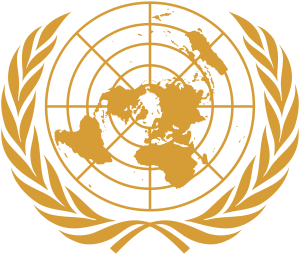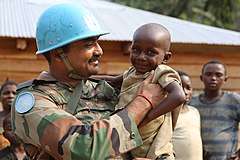United Nations Department of Peace Operations
The Department of Peace Operations (DPO) is a department of the United Nations charged with the planning, preparation, management and direction of UN peacekeeping operations. Previously known as the Department for Peacekeeping Operations (DPKO), it was created on 1 January 2019 as part of a restructuring of the UN's peace and security apparatus.[3] The DPO retains the core functions and responsibilities of its predecessor, with a greater emphasis on cohesion, integrating different resources and knowledge, and promoting human rights.[3]
 | |
| Abbreviation | DPO |
|---|---|
| Formation | March 1992 [1] [2] |
| Headquarters | United Nations Headquarters |
Head | Under-Secretary-General for Peacekeeping Operations Jean-Pierre Lacroix |
Parent organization | United Nations Secretariat |
| Subsidiaries | Office of Operations, Office of Rule of Law and Security Institutions, Office of Military Affairs, Policy, Evaluation and Training Division |
| Website | |
With an annual budget of roughly $6.5 billion,[4] the DPO is the largest UN agency by expenditure, exceeding the UN's own regular budget.[5] As of March 2020, it oversees 81,370 personnel serving in thirteen peacekeeping missions.[6]
History
The DPO traces its roots to 1948 with the creation of the United Nations Military Observer Group for India and Pakistan (UNMOGIP) and the United Nations Truce Supervision Organisation (UNTSO). Up to the late 1980s, peacekeeping missions were operated by six officials in the United Nations Office of Special Political Affairs, which was headed first by Under-Secretary-General Ralph Bunche, and subsequently Brian Urquhart and Marrack Goulding.[7] From the beginning, peacekeeping operations operated with a clear doctrine that applied to its traditional or classical peacekeeping operations for inter-state ceasefires: peacekeepers did not take sides or discharge firearms, save in self-defense, or meddle in politics.
The Department of Peacekeeping Operations was created in March 1992 when Boutros Boutros-Ghali took office as Secretary-General of the United Nations; its creation was one of his first decisions.[8] In organisational terms, it upgraded and expanded upon the work of the previous Field Administration and Logistics Division (FALD) (which remained active as a subordinate department).[9] Goulding became under-secretary-general (or USG) for peacekeeping with Kofi Annan appointed as his deputy. The role of the DPKO, however, wasn't clarified until June 1992, when Boutrous-Ghali issued an An Agenda for Peace, a plan to strengthen the UN's capacity for preventative diplomacy and peacekeeping.
Organizational structure
DPO is split into two main offices: the Office of Operations and the Office of Mission Support (OMS).
Included within the Office of Mission Support are the logistics and administrative divisions, which provide logistics, personnel, and financial support services to DPO missions. OMS is responsible for determining financial reimbursement to UN member states for their contribution of Contingent owned equipment, troops, and services to peacekeeping missions. Letters of Assist are an important part of this. Also part of DPO are Mine Action, Training, Best Practices, and Military and Police Divisions.
A March 2007 United Nations General Assembly Resolution titled “Strengthening the capacity of the Organization in Peacekeeping Operations” has called for the re-structuring of the department and the establishment of a separate Department of Field Support. Whereas the new entity serves as a key enabler by co-ordinating the administration and logistics in UN peacekeeping operations, DPO concentrates on policy planning and providing strategic directions.
This re-organisation was paralleled by a DPO reform effort launched in 2005 entitled 'Peace Operations 2010', which further pursues reforms initiated by the 'Brahimi Report' Report of the Panel on United Nations Peacekeeping Operations. This included an increase in personnel, the harmonization of the conditions of service of field and headquarters staff, the development of guidelines and standard operating procedures, and improving the partnership arrangement between the Department of Peace Operations (DPO) and the United Nations Development Programme (UNDP), African Union and European Union. One area of this reform effort has been the development of clearer internal doctrine or guidance for UN peacekeeping. The highest level DPO doctrine document was issued in 2008, known as the 'capstone' doctrine.[10]
Very recently with the newest reform efforts, Secretary-General Guterres has made efforts to streamline peacekeeping efforts to conserve finances, and eliminate excess and unnecessary roles. As an effort to be brought together and streamlined, shared regional divisions of the DPA and DPO will restructure and remove duplication of tasks and duties allowing for more manpower readily available to explore new initiates and operations. This gives the department more resources and responsibilities for broader peace building efforts, which are of course by their nature linked to political analysis and strategy (Cliffe, 2018). While peacekeeping operations are at an all-time high, and funding continues to receive budget cuts, making effective business moves will allow peacekeeping operations to remain intact. By merging organizations, the shift in shared duties and management will allow for a wider spectrum of operations to be ready and available for troops on the ground. Less time duplicating work allows for more time to think of broader trends in security and employing preventative measures for future threats and streamlined transportation efforts.
List of Heads
The following is a chronological list of those who have held the position of Under-Secretary-General for Peacekeeping Operations[11]:
| Under-Secretary-General | Country of origin | Years served | UN Secretary-General |
|---|---|---|---|
| Jean-Pierre Lacroix | April 2017 – Present[12] | António Guterres | |
| Hervé Ladsous | September 2011 – March 2017[13] | Ban Ki-moon | |
| Alain Le Roy | June 2008 – August 2011[14] | ||
| Jean-Marie Guéhenno | October 2000 – June 2008[15] | Kofi Annan | |
| Bernard Miyet | January 1997 – September 2000[16] | ||
| Kofi Annan | March 1993 - December 1996[17] | Boutros Boutros-Ghali | |
| Marrack Goulding | March 1992 - March 1993[18] |
Financing
The bulk of peacekeeping operations funding is appropriated much like the general budget, but permanent members of the Security Council are required to pay a larger share, and all states are free to contribute additional funding, equipment, or other services to missions of their respective choices.[19]
Current operations
As of 2010, DPO leads 16 different missions in Africa, the Caribbean, the Middle East, Americas, Europe and Asia.[20] Serving in these missions are over 100,000 uniformed and civilian personnel. Total approved annual expenses are over US$5 billion for the period July 2006 to June 2007.[21]
"The Surge"
At an October 2006 press conference, then USG Jean-Marie Guéhenno announced that peacekeeping operations had reached an all-time high, and will continue to expand as UNIFIL and UNMIT reach full strength, and if a UN mission enters Darfur.[22]
References
- http://www.globalgovernance.eu/wp-content/uploads/2015/02/GGI-Factsheet-History-of-UN-Peacekeeping_October2012.pdf
- Findlay, Trevor (2002). The Use of Force in UN Peace Operations (PDF). Oxford University Press. p. 164.
- "UN reform: Two new departments for the peace and security pillar | Permanent Missions". www.un.int. Retrieved 2019-06-26.
- "A/C.5/73/21 - E - A/C.5/73/21". undocs.org. Retrieved 2020-08-11.
- Expenditure by agency, 2018
- "DATA". United Nations Peacekeeping. Retrieved 2020-08-11.
- "UN. Office for Special Political Affairs". UN Archives and Records Management Section. Retrieved 18 March 2017.
- Findlay, Trevor (2002). The Use of Force in UN Peace Operations (PDF). Oxford University Press. p. 164.
- Hill, S. (2004-10-01). United Nations Disarmament Processes in Intra-State Conflict. Springer. pp. 246 (note 87). ISBN 9780230502963.
- "Peacekeeping Resource Hub" (PDF). pbpu.unlb.org. Retrieved 11 April 2018.
- "Transparency in the selection and appointment of senior managers in the United Nations Secretariat (A/66/380)". 27 September 2011. p. 42.
- "Mr. Jean-Pierre Lacroix of France - Under-Secretary-General for Peacekeeping Operations". United Nations Secretary-General. 2017-02-14. Retrieved 2019-04-30.
- "Secretary-General Appoints Hervé Ladsous of France Under-Secretary-General for Peacekeeping Operations". www.un.org. 2 September 2011. SG/A/1305. Retrieved 2019-05-13.
- "SECRETARY-GENERAL APPOINTS NEW PEACEKEEPING CHIEF, ALAIN LE ROY OF FRANCE". www.un.org. 30 June 2008. SG/A/1142. Retrieved 2019-05-13.
- "SECRETARY-GENERAL APPOINTS JEAN-MARIE GU+HENNO UNDER-SECRETARY-GENERAL FOR PEACEKEEPING OPERATIONS". www.un.org. 26 June 2000. SG/A/736. Retrieved 2019-05-13.
- "Secretary-General Announces New Appointments". www.un.org. 28 January 1997. SG/A/627. Retrieved 2019-04-30.
- "KOFI ANNAN, UNITED NATIONS SECRETARY-GENERAL | Meetings Coverage and Press Releases". www.un.org. Retrieved 2019-05-13.
- "Secretary-General Saddened by Death of Sir Marrack Goulding, Key Figure in Creating Department of Peacekeeping Operations". www.un.org. Retrieved 2019-04-30.
- "Financing of UN Peacekeeping Operations". un.org. Retrieved 11 April 2018.
- https://peacekeeping.un.org/en/where-we-operate DPO Current operations
- "Background Note - United Nations Peacekeeping Operations". un.org. Retrieved 11 April 2018.
- "Top UN peacekeeping official warns of 'overstretch' as mission staff numbers surge: Press conference by Under-Secretary-General for Peacekeeping Operations Jean-Marie Guéhenno". un.org. Retrieved 11 April 2018.
External links
- United Nations Department of Peacekeeping Operations Official Website
- United Nations Rule of Law: The Department of Peacekeeping Operations, on the rule of law work conducted by the Department of Peacekeeping Operations.
- SPIA - Soldiers of Peace International Association
